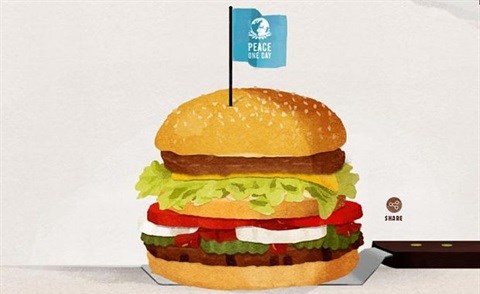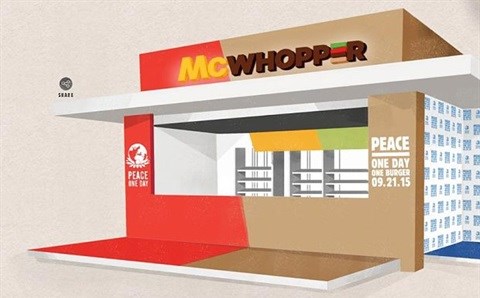Hello keyboard terrorists.
We know you're angry and we know you enjoy waving your proverbial pitchforks about on your fickle bandwagon ride (and keep in mind that Burger King are aware of this as well). So we're going to ask you to take a chill-pill and objectively consider what just went down.
So Burger King peacefully challenged (clue one, that's an oxymoron) longtime rival McDonald's to a collaborative effort in aid of 'peace'; specifically in aid of Peace One Day. They are the nonprofit who would receive all proceeds from the tantalisingly monstrous McWhopper - a burger that would make any fast-food glutton (like our copywriter) freak out. Burger King's proposed pop-up would make McDonald's meet them halfway (literally) in Atlanta - the midway point between their respective headquarters in Chicago and Miami.
The campaign is a stroke of genius, with nice-guy Burger King graciously making the effort to go ahead and design the entire look and feel of the campaign; from the the packing to the pop-up store itself (remember, they're proposing a 'collaboration'). Essentially, all that McDonald's would have to do is pitch up.
Now, as businesses, we all know how much of our time we spend looking in the mirror. Specifically, we all know how seriously we take our brand and how we respond and interact with our competitors. With that in mind, if your biggest competitor came up to you with a bow-tied Christmas-came-early Ford Mustang, wouldn't you raise an eyebrow? Isn't that too easy, too good to be true and doesn't it remind you of an infamous war in Ancient Greek Mythology? There were some Trojans, a seriously hot babe, a demigod, a thousand Greek ships (although I don't think they have as many now) and a big, wooden horse? Remember?
Well, the McWhopper is Burger King's ingenious Trojan Horse - this is no olive branch, it just looks like one. Let's take a moment to consider how surreptitious a full-page peace proposal in the New York Times is. Burger King weren't proposing anything. They were campaigning for the public's approval in an attempt to strong-arm McDonald's into agreeing. For McDonald's, it's a catch-22. No matter how they respond, Burger King wins. If McDonald's accepted, they would have had to pitch up, wearing Burger King's 'award-winning' stroke of content marketing genius as a t-shirt, which is completely patronising. This is Burger King's idea and Burger King's campaign; this is not a collaboration (and honestly, if Burger King were all about a ceasefire and a collaboration, they would have proposed a collaboration as opposed to designing the entire campaign themselves). Burger King would have had a much stronger case had they revealed that they went to McDonald's and couldn't successfully reach them.

But alas, McDonald's have declined and consequently (we're guessing, much to Burger King's satisfaction), the social media world has set itself on fire. No other multinational brand would find this kind of proposal acceptable, and McDonald's CEO, Steve Easterbook's response, "A simple phone call will do next time," is completely understandable. Where is the true 'collaboration'? How hard was it for Burger King to pick up the phone and request a collaborative campaign and why didn't they? Clearly, this is not in aid of peace. It's a marketing campaign (and an extremely malevolent one at that) that wears world peace as a mask. Clearly this is about manipulating the masses to amplify the voice of Burger King through their personal crusade of sharing and commenting. It's an automatic content generator.
So, how relevant is this really for Peace One Day? Is this about 'world peace' in the face of ongoing war or is it a one-up manship competition between marketing directors? Is it about getting you to complain about McDonald's for the unbridled glee of Burger King's marketing department? Clearly, this campaign isn't 100% sincere. It's about getting people talking about Burger King and hating on McDonald's. Simple.
Don't get us wrong. The campaign is brilliant, because content is about making you famous and getting the word out. So, in a way, Burger King have created an undeniably successful campaign, but we suggest they read a textbook on ethical business operations.
Also, we're guessing that this is what went down at Burger King's marketing department last week:













































